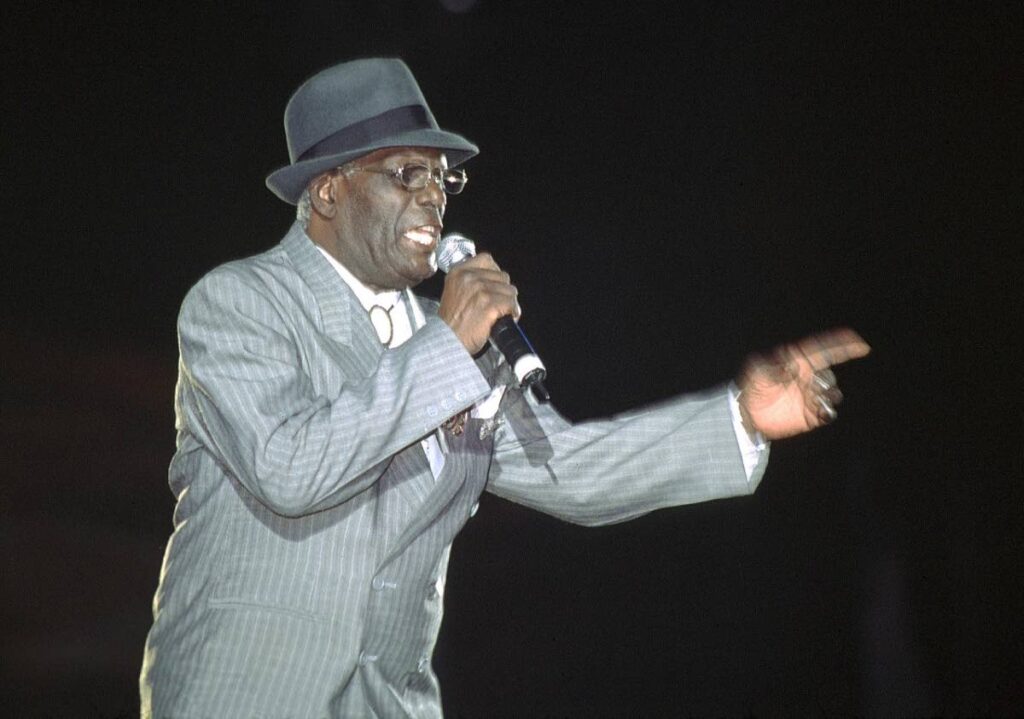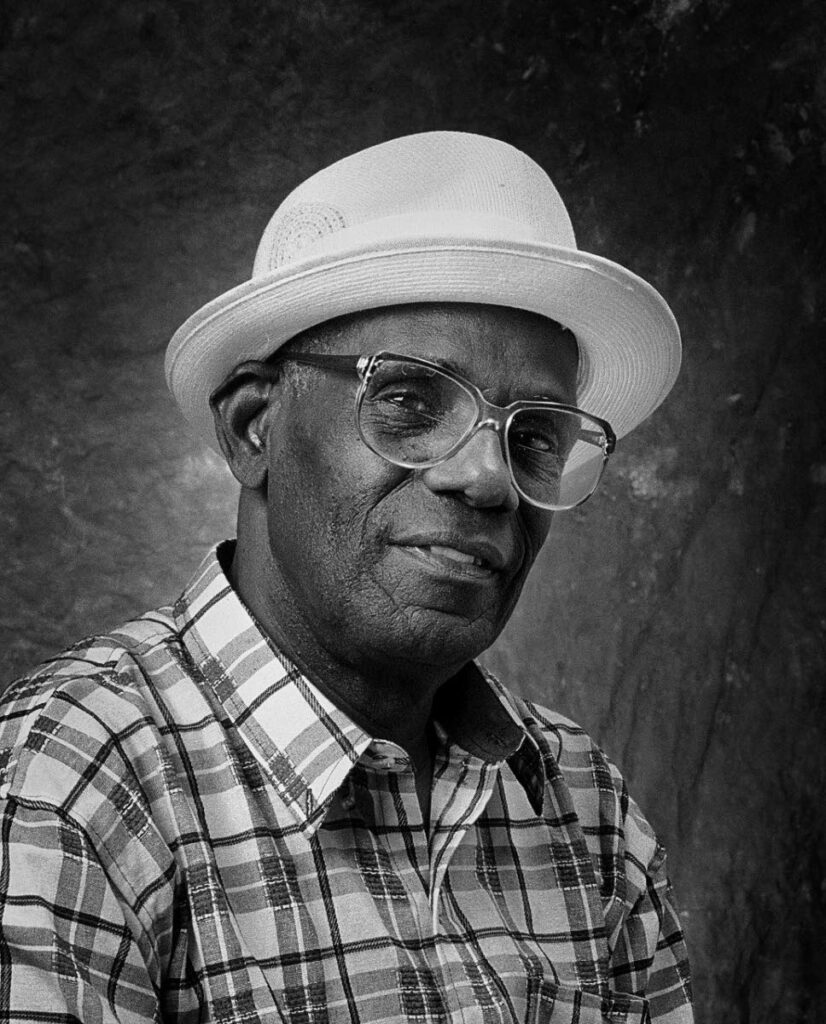Mighty Bomber's legacy, making calypso lovers laugh

In a career that spanned over 70 years, Clifton Ryan, the Mighty Bomber, never bombed as a calypsonian. Singing social commentary about equality, peace, patriotism and honesty along with humorous calypsoes, which conjured up the memories and mannerisms of Theophilus Philip (Spoiler), Bomber evoked laughter in generations of calypso lovers.
One rumour about Bomber and a famous calypso has become legendary.
Calypso expert and UWI) professor emeritus Dr Gordon Rohlehr said, “There were all kinds of stories around Bomber.
“One I heard from several calypsonians was that the calypso Portrait of Trinidad, sung by Sniper (Mervyn Hodge) was originally meant for Bomber. But Bomber could not sing ‘Trinidad, this lovely land of my birth,’ because he wasn’t born in Trinidad.”
Born in St George’s, Grenada on January 30, 1928, Bomber always said he began singing at 12. He migrated to Trinidad in 1956 and stayed with his Grenadian friend Small Island Pride (Theophilus Woods). Lord Melody (Fitzroy Alexander) encouraged him to sing in calypso tents.
Bomber’s calypsoes had timeless themes. From early in his career, he sang against racial discrimination, corruption, crime and violence. He did not mince his words. In The Motion, he sang that “worthless women and don’t-care men are a menace to Trinidad…send worthless women to jail and give don’t-care men strokes with cat o’nine tails.”
In Old Man’s Darling, he sang about a young girl being “friendly” with a 72-year-old man.
“It’s best to be an old man’s darling rather than a young boy’s slave,” he crooned.
In Kiss of Fire he offered a picong about Melody’s kissing prowess.
As his phrasing and mannerisms became more like Spoiler’s, Bomber sang My Unfortunate, which had an uncanny resemblance to Spoiler’s humour. It included an anecdote about losing an arm in a taxi car accident, a trip to the hospital’s casualty department and the charge of armed robbery. In the next verse, the person who saved him from drowning in the Normandie Hotel pool after a performance uses his underwear to wipe Bomber’s face and puts a rope around his neck to hang him out to dry.
In 1964, Bomber won the Calypso King title with Bomber’s Dream and Joan and James. It was a remarkable and unusual feat to beat Sparrow (Slinger Francisco) at the height of his glory and win a calypso crown with two humorous calypsoes.
In Bomber’s Dream, Bomber seeks Spoiler’s advice for a calypso-crown-winning song. Spoiler offers his strategy, which Bomber takes to heart using Spoiler-style absurdity to win the judges’ nod. Without crossing the line from humour into smut, Bomber sealed his win with Joan and James, a somewhat suggestive song about two children thinking of a game to play, and deciding to be Mummy and Daddy, with a baby to take care of.
Although often ignored in competitions, like most calypsonians who delved into humour after Spoiler, Bomber stuck to his chosen path and mentored young calypsonians throughout his career.
Neville “Bunny B” Brown knew Bomber since the time Brown was a young musician, when he wasn’t singing yet, but playing trombone in Sparrow’s Young Brigade in the 1980s.
“Bomber was the stage manager, and he was a stickler for time. After intermission, when it was time to go on stage, musicians were scattered all about and Bomber rounded them up.”
Bunny B said Bomber also served as a songwriter in the Young Brigade.
“Bomber wrote for calypsonians who had sweet voices, but no songs. Bomber should be remembered as one of the few calypsonians who beat Sparrow in competition when Sparrow was at his best. Bomber and Dougla (Cletus Ali) have that distinction.”

In many ways, Bomber was a word craftsman.
“He had impeccable diction,” said Bunny B. “He always stressed word choice and phrasing. He sang at a moderate tempo to emphasise certain words. He helped calypsonians with presentation and always said, ‘You have to take your time and feel your words.’”
Bomber was also known for his dandy style of dressing with a fedora, suit, tie and polished dress shoes.
“Kitchener, Terror, Pretender, Bomber, Growling Tiger, Roaring Lion had a dress code. They held their clothes in high esteem. If a man like Growling Tiger could sing ‘When I dead, bury my clothes,’ it shows how much clothes meant to that generation of calypsonians,” said Bunny B. (Kitchener – Aldwyn Roberts, Terror – Fitzroy Henry, Pretender – Aldric Farell, Growling Tiger – Neville Marcano, Roaring Lion – Rafael de Leon, singers during the golden age of calypso, have all passed away.)
Bomber’s last performances were in Weston “Cro Cro” Rawlins’s Icons calypso tent.
“He sang with me for the last four years of his performance life,” said Cro Cro. “His eyesight was failing. He was in his 80s.
“He loved Spoiler and believed in him. Bomber did that Spoiler style of calypso greater than anyone else since Spoiler.”
Cro Cro felt Bomber’s prowess was never fully appreciated.
“Bomber was a great calypsonian. It’s sad he couldn’t have won more competitions. As an older calypsonian, he didn’t get the respect he deserved.”
Like Bunny B, he remembered Bomber as an “elegant” dresser.
“I want to sing about how calypsonians – especially women – are dressing these days for attention. Bomber sang with a jacket and tie, let the lyrics work for him and mashed up the place.”
Rohlehr described Bomber as “very witty. I always loved Bomber’s work. One of the calypsoes I haven’t heard mentioned much is Bomber’s Sister, an extremely witty, but grim calypso about a girl who runs away from school and becomes a vagrant.”
Rohlehr considered Bomber a good teacher for the younger people coming into calypso.
Bomber’s son Reagan Ryan said the family had a newspaper story about his dad being named father of the year in 1966.
“My dad was a family-oriented man. There were eight of us, five boys and three girls. He adopted a ninth child.
“Dad always played with his children. He flew kites, played spin the top and pitched marbles with us. We didn’t need anyone outside of our family to have fun,” said Ryan.
Bomber supervised homework, ensured his children received the education he did not get and had encyclopedias and books in the house to support learning.
“He opened the scriptures and read with us,” said Ryan. “Dad was just fun. We had our little challenges, but he made sure we had everything we needed – even if he had to go without.”
Bomber was strict.
“We had a particular time to reach home from school. He walked the distance and came up with a time range to reach home. If you went over that time, you had to answer, ‘Where were you?,’ and if you couldn’t answer, you had a cut-tail booked. He didn’t beat for many things, but we had to hold our hand out and count the lashes. He would say, ‘You count. I can’t count.’”
Their house in Laventille was always filled with music.
“Singing Francine (Edwards), Tobago Crusoe (Ortneil Bacchus) and Terror came to our home often.”
Then Bomber gave up singing calypso to go to church.
“It was challenging for him to break away from calypso,” said Ryan. “He began writing gospelypso.”
Ryan remembered Bomber’s emphasis on language and pronunciation.
“As a young man people used to say to me, ‘You think you are an Englishman?’ because of how I spoke with Dad’s teaching. Dad always spoke with clarity. He operated by words and gave clear instructions, so if you got punished, it was because you clearly broke rules that you had understood.”
Bomber’s love for entertainment seeped into his home. He made sure all his children could sing.
“We had training sessions on how to breathe while singing; how to stand and deliver a song; how to sing properly and hold a note. Dad was self-taught.”
Most of all, Ryan remembers being nine years old and singing in Memorial Park with four of his brothers and sisters as his dad played guitar.
“Every Sunday for two years we sang folk songs like Mangos, Johnny Grotto and Yellowbird from 2-5 pm. Many families went to Memorial Park in those days, and Dad felt they should have some family entertainment.”
Bomber died of cardiovascular disease on January 1, 2022, just weeks before turning 94.
“He lived a good, bright life,” said Rohlehr. “We’re losing these great ones of calypso, but it is inevitable.”
All who knew Bomber will remember his gift for evoking laughter and his mission to keep Spoiler’s legacy alive. But he was also an original voice in his own right.


Comments
"Mighty Bomber’s legacy, making calypso lovers laugh"